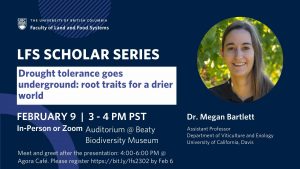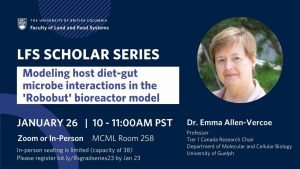Land and Food System Scholar Series
Invited scholar: Dr. Megan Bartlett
Hosted by: Thorsten Knipfer and Risa Sargent, Plant Science
Title: Drought tolerance goes underground: root traits for a drier world
Abstract: Most of plant resistance to water transport from the soil to the canopy during drought comes from the roots. Climate change is expected to increase evapotranspiration and exacerbate soil drying. Developing crops that can maintain water uptake from drier soil is a potential strategy to compensate without increasing dependence on irrigation. I will talk about my lab’s work using grape rootstocks as a diverse study system to identify traits that maintain root water uptake under drought. Our findings show that classic water relations traits that have long been measured for leaves can also be applied to capture root drought tolerance.
Biography: Dr. Megan Bartlett is an assistant professor in the Department of Viticulture and Enology at the University of California, Davis. She conducted her Ph.D. research on plant ecophysiology with Dr. Lawren Sack at UCLA and her postdoc research on using optimization theory to understand plant adaptations to drought with Dr. Stephen Pacala at Princeton University. As a plant physiologist, her work is focused on the mechanisms underlying plant drought and heat tolerance. Her research applies insights from fundamental plant physiology to address challenges facing the grape and wine industry.
Join in person or via Zoom:
Date: February 9, 2023
Time: 3:00-4:00 PM PST
Location: In-person at Auditorium at Beaty Biodiversity Museum or via Zoom
This presentation will be followed by a meet and greet from 4:00 PM – 6:00 PM at Agora Café. Refreshments will be served.
Please register here by Feb 6.
*Note: Admission desk staff will identify in-person attendees before entering the Museum. No food or drinks are permitted in the Museum.

